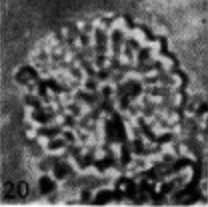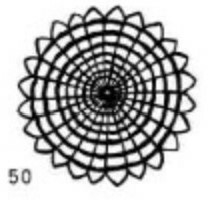Davidbukrya perpolitus
Discoaster perpolitus Martini, 1961
Emended by Varol, 2023: A very large (13.0–20.0 μm) rosette-shaped asterolith has a concentrically ornamented disc and a solid birefringent tube cycle. The non-birefringent disc is made up of between 22 and 30 segments joined along most of their length.
In cross-polarised light, with the gypsum plate, blue regions correspond to the horizontal axis in Plate 21, Figs. 15, 18 in Varol (2023). In the same view, the tube cycle and the disc produce dextrogyre extinction lines; therefore, these views are considered to be the distal sides of this rosette-shaped asterolith. This species has not been observed in a mobile mount; therefore, its optical properties are not mapped across different profiles (e.g., proximal, distal).
Davidbukrya perpolitus differs from the other species of Davidbukrya by having a large, concentrically ornamented disc. In Davidbukrya clemencesalleyae, the disc lacks concentric ornamentation and displays bulging around the tube cycle.
Martini, E. 1961. Nannoplankton aus dem Tertiär und der obersten Kreide von SW-Frankreich. Senckenbergiana Lethaea. 42: 1-32.
Varol, O. 2023. New paleocene calcareous nannofossils: Carlamuelleria, Davidbukrya, Mauriceblackia, Noelia and Senelia. Marine Micropaleontology. 180: 1-41.

